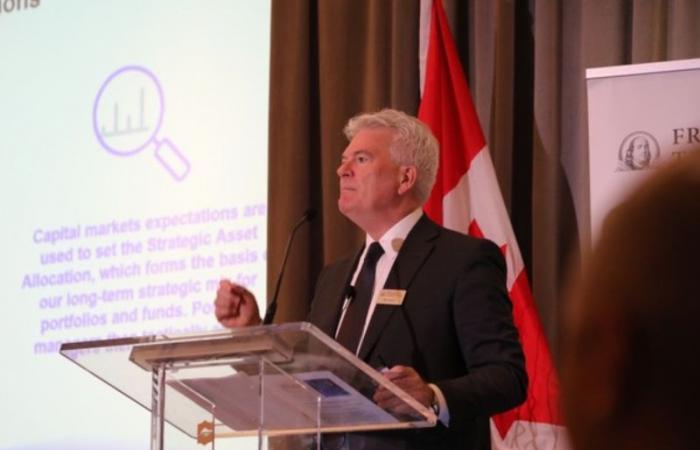He anticipates some stabilization of inflation as rates move closer to targets set by central banks. “Long-term inflation expectations remain anchored: we therefore expect it to remain stable and under control. » Ian Riach also believes that there will continue to be issues linked to supply chains, “there always are”, but that, despite a slight decline in recent years, global economic interdependence remains a reality dominant.
On fiscal policy, the portfolio manager at Franklin Templeton believes fiscal policy support is set to moderate due to rising public debt levels. “This applies to both developed and emerging markets. » He also sees the rise of nationalism in certain countries as a factor that can negatively influence international trade, by reinforcing protectionist policies. “As inflation decelerates, central banks will have more flexibility to adjust their monetary policies and rates are therefore expected to normalize. »
Over the long term, he believes the global equity market should outperform bond yields and offer an average risk premium. “Expected returns on fixed income have become slightly less attractive as rates have declined over the past year. » However, he expects that over time, higher valuations and margins will pose obstacles to global equity performance. “In any case, in our view, stocks in developed markets (EAFE, ie outside North America) and emerging markets should outperform those in the United States and Canada. »
In the shorter term, the first vice-president at Franklin Templeton points out that the various macroeconomic themes (growth, inflation, and fiscal and monetary policy) are under the sign of “divergence”, while they do not follow all the same direction or trend. “The synchronized global economic recovery from lockdowns and the pandemic is behind us. There are now divergences and economies that are no longer progressing at the same pace.”
For example, he observes that the United States continues to be the leader in terms of growth. “We also notice that Canada is improving its margins, while other regions, such as Europe, are facing challenges. The same is true with inflation, where it seems more persistent elsewhere. Divergence. »
No recession in sight, US economy expanding
Jeff Schulze, managing director and head of economic and market strategy at ClearBridge Investments, a subsidiary of Franklin Templeton, gave an overall rosy assessment of the economic health of the United States, “on the way to achieving its soft landing”.
“Of all the twelve indicators that have traditionally predicted a recession, only a few are red, and several yellow lights are on the way to becoming green,” he explained, predicting that overall, in a strong probability of 85%, the expansion of the American economy would continue in 2025.
“Even if the pace of job creation has slowed somewhat in recent years, it has reached a cruising speed which is in line with that of previous phases of expansion and which is based on solid foundations. »
The expert points out that major consumers, who make more than 38.9% of consumer spending, are the responsibility of the 20% of the largest earners. “Consumption is one of the key factors in this economic cycle. And although lower-wage consumers face challenges, the strength of higher-income consumers offsets this imbalance. »
The U.S. consumer has become less sensitive to interest rates since the global financial crisis when ultra-low rates encouraged greater use of fixed-rate mortgages compared to variable rates, according to the chief executive of ClearBridge Investments. “A very large portion of them have locked in low fixed rates: 90% of Americans have fixed mortgages of 15-30 years. » Mortgage debt represents more than two-thirds of American consumer borrowing. “Although the current rate for 30-year fixed-rate mortgages is around 7%, the average rate Americans pay is only 3.9%. »
Another positive indicator is that corporate profits are increasing and imply strong economic resilience which reduces the likelihood of drastic adjustments, such as staff reductions. “Unlike past economic cycles (dating back to 1965), where a decline in corporate profits often preceded a recession, the current trend is not pointing in that direction. »
Jeff Schulze also notes that productivity is back in the United States, after falling well below the historical average after the financial crisis. “It has recently recovered and is now back in line with the long-term average. » He believes that although the benefits of AI have not yet been realized, the technology could unleash a wave of sustained productivity, akin to the Internet revolution, by improving processes, automating complex tasks and creating new economic opportunities.
An excitement on the stock markets which could continue
The expert at ClearBridge Investments notes that the current valuations of the Big 7, these tech giants of the S&P 500, are trading at a significant premium and distort the overall valuation of the benchmark index, which can give an exaggerated impression of expensive for the index. “The other securities (the other 490) are trading at a more reasonable valuation, more aligned with historical valuation levels. »
“Don’t be afraid of the stock market peaks, on the contrary it is the time to act. » In the context of a market which is reaching peaks and where some investors are reluctant to invest, Jeff Schulze demonstrated that historically these moments have nevertheless constituted good entry points for investors in the long term. “Surprisingly, investing your money during such periods (peaks) has historically outperformed investments made when the benchmark index is below its peak, on average. »
The head of economic and market strategy at ClearBridge Investments says he is convinced that we are in a new secular bull market (Secular Bull Market)or a prolonged period, during which the prices of financial assets, such as stocks, generally increase. “We risk having other peaks as we progress in this second part of the decade. »
“In the 12 months following an all-time high, stocks have historically risen 8.3% on average, with positive returns 70% of the time. » While he foresees both volatility and an upward movement in the markets in the United States (“the American exception which will outperform other regions of the globe”), the expert believes that so-called value securities could regain their former glory, after having ceded the upper hand to growth stocks.
The event Global Investment Outlook 2025closed with’speech by John Kasich, former Republican governor of Ohio and candidate for the Republican presidential nomination, who came to share his thoughts in the wake of the latest electoral results south of the border.






